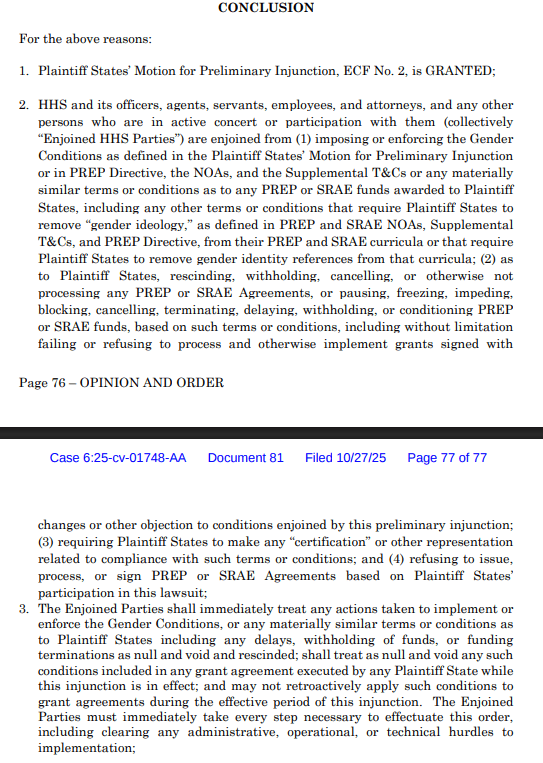Federal Judge Ann Aiken Halts Trump Administration Policy Blocking School Funds Over “Gender Ideology”
A federal judge in Oregon has temporarily halted one of the Trump administration’s most controversial education funding rules, marking a major legal setback for the White House’s ongoing efforts to reshape federal sex education policy. The ruling, issued on October 20, 2025, by U.S. District Judge Ann Aiken, blocks the Department of Health and Human Services from enforcing a directive that tied billions of dollars in federal PREP and SRAE grants to the exclusion of “gender ideology” content from sex education programs across sixteen states.

Judge Aiken’s 77-page opinion labeled the Trump administration’s new rule “arbitrary and capricious,” arguing that it unlawfully discriminated by singling out LGBTQ+ inclusive material while allowing other sensitive topics to remain untouched. In her view, the policy effectively imposed a “separate-but-equal” structure on sex education, restricting programs that provide inclusive guidance for transgender and nonbinary youth. The ruling halts enforcement nationwide while the case proceeds, giving schools and community organizations temporary relief from losing funding over gender identity discussions.
The blocked directive had been announced in August 2025 as part of a broader Trump administration initiative to reshape federally funded education. The policy required any state receiving funds under the Personal Responsibility Education Program (PREP) or the Sexual Risk Avoidance Education (SRAE) program to certify that their materials would not include lessons suggesting gender identity could differ from biological sex. Failure to comply meant forfeiting millions in federal dollars aimed at youth health education.

Supporters of the administration described the rule as a necessary step to “restore moral clarity” to classrooms, arguing that federal funds should not promote what they call “gender ideology.” The policy was viewed as part of a larger effort under President Trump to realign federal funding with what his administration called “traditional American values,” particularly in areas such as family, faith, and education.

However, Judge Aiken’s ruling drew strong reactions from both sides of the political divide. Progressive advocates and LGBTQ+ organizations hailed it as a victory for equality and educational freedom, claiming the administration’s policy was an overreach designed to silence inclusive voices. On the other hand, conservatives and Trump allies denounced the decision as judicial activism, accusing Aiken of undermining executive authority and overstepping the court’s proper role.
The Trump administration is widely expected to appeal the injunction, with several officials emphasizing that they believe the ruling will eventually be overturned. Legal experts note that while Aiken’s decision is preliminary, it sends a signal that the court views the government’s arguments as weak under current administrative law. The Justice Department could seek an emergency stay to reinstate the funding restrictions pending appeal, but such a move may face uphill challenges given the detailed nature of Aiken’s findings.

This ruling adds to a growing list of federal court battles over cultural and educational issues during President Trump’s second term, as the administration continues to confront state and judicial resistance to its social agenda. The education funding case is likely to become a flashpoint in the ongoing national debate over how much power the federal government should have in shaping what students learn about gender and sexuality in public schools.
For many Americans, the case reflects deeper questions about the balance between federal oversight, local control, and the role of cultural values in taxpayer-funded education. Judge Aiken’s injunction ensures that—for now—states cannot lose essential youth education funding for maintaining inclusive content. But with the administration vowing to “fight this in every court possible,” the political and legal battle over gender identity education is far from over.

